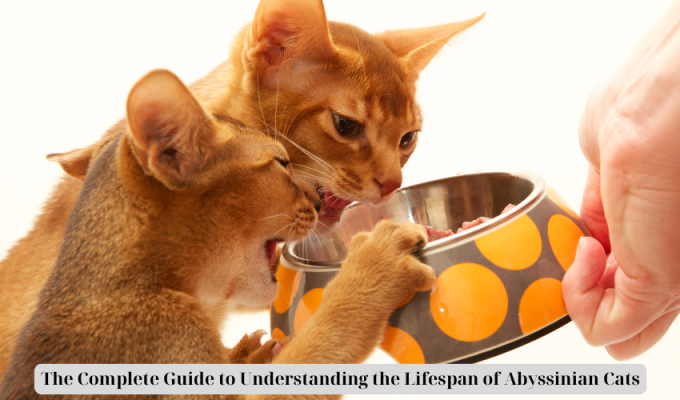
Discover everything you need to know about the lifespan of Abyssinian cats in this comprehensive guide.
Introduction to Abyssinian Cats
The Abyssinian cat is a unique and ancient breed with a rich history that traces back to ancient Abyssinia, now known as Ethiopia. While there are conflicting stories about the origins of the breed, it is widely believed that the Abyssinian cat has roots in Egypt and eventually made its way to Europe. This breed has been around for thousands of years and is known for its distinctive appearance and playful nature.
Abyssinian cats are known for their acrobatic abilities and high energy levels. They are intelligent and trainable, making them a popular choice for cat owners who are looking for a lively and interactive pet. With their striking coat colors and athletic build, Abyssinians resemble wild cats and often exhibit behaviors that reflect their active nature. However, they also have a gentle and affectionate side, making them great companions for older children and even dogs.
If you’re considering welcoming an Abyssinian cat into your home, it’s important to understand their unique needs and characteristics. From their grooming requirements to their preference for ample space and stimulation, Abyssinians thrive in environments where they can receive the attention and engagement they need to stay happy and healthy. Overall, the Abyssinian cat is a fascinating and lively breed that can bring joy and excitement to any household.
History and Origins of the Abyssinian Breed
The Abyssinian breed has a rich history that dates back to ancient times. While the name “Abyssinian” is derived from the ancient region of Abyssinia, which is now modern-day Ethiopia, many experts believe that the breed actually originated in Egypt before making its way to Europe. One popular story suggests that a British soldier adopted a female kitten named Zula from a port in Alexandria in 1868, although there is no concrete evidence to support this claim. The first official recognition of the Abyssinian breed occurred in 1882, with no known link to Zula. Another theory posits that the Abyssinian breed has its roots in ancient Egypt, with evidence from ancient paintings and sculptures depicting cats that resemble the Abyssinian.
Key Points:
– The Abyssinian breed is believed to have originated in Egypt before making its way to Europe.
– The first official recognition of the breed occurred in 1882, with no known link to the popular story of Zula.
– Evidence from ancient paintings and sculptures supports the theory that the Abyssinian breed has ancient origins in Egypt.
Notable Facts:
– The Abyssinian breed is thought to be a mix of Siamese, Burmese, and Russian Blue.
– The breed comes in nine recognized colors, with the main colors being Ruddy, Sorrel, Blue, and Fawn.
– Abyssinians are known for their acrobatic and athletic nature, as well as their intelligence and trainability.
Typical Lifespan of Abyssinian Cats
Abyssinian cats have a typical lifespan of 9-15+ years. This is relatively long compared to other cat breeds, and with proper care and attention, Abyssinians can live well into their teens. It’s important to provide them with a healthy diet, regular veterinary check-ups, and a stimulating environment to keep them happy and healthy.
Factors Affecting Lifespan
Several factors can affect the lifespan of Abyssinian cats. Genetics play a significant role, so it’s important to choose a reputable breeder who conducts health screenings and genetic testing. Providing proper nutrition, regular exercise, and mental stimulation can also contribute to a longer lifespan for Abyssinians. Additionally, prompt veterinary care for any health issues that may arise can help ensure a longer and healthier life for these cats.
- Genetics
- Nutrition and Exercise
- Mental Stimulation
- Veterinary Care

Factors Affecting the Lifespan of Abyssinian Cats
Genetics
One of the most significant factors affecting the lifespan of Abyssinian cats is genetics. Like all living creatures, Abyssinians inherit genetic traits from their parents, which can impact their overall health and longevity. It’s important to ensure that the breeder you choose has a good reputation and practices responsible breeding to minimize the risk of hereditary health issues.
Diet and Nutrition
The diet and nutrition of an Abyssinian cat play a crucial role in determining its lifespan. A well-balanced diet that meets all of the cat’s nutritional needs is essential for maintaining good health and preventing chronic diseases. It’s important to provide high-quality cat food and ensure that the cat maintains a healthy weight to avoid obesity-related health issues.
Exercise and Mental Stimulation
Regular exercise and mental stimulation are vital for the overall well-being and longevity of Abyssinian cats. These cats are known for their playful and active nature, and providing them with opportunities for physical activity and mental stimulation can help prevent obesity, boredom-related behavior problems, and promote good mental health.
By addressing these factors and providing proper care, attention, and a nurturing environment, Abyssinian cat owners can help ensure that their feline companions live long, healthy, and happy lives.
Common Health Issues in Abyssinian Cats
1. Retinal Atrophy
Retinal atrophy is a common hereditary issue in Abyssinian cats, which can lead to deteriorating vision over time. This condition can cause blindness in severe cases and may require ongoing veterinary care to manage.
2. Pyruvate Kinase Deficiency
Pyruvate kinase deficiency is another hereditary issue that can affect Abyssinian cats. This condition can lead to anemia and may require regular monitoring and management by a veterinarian.
3. Dental Issues
Abyssinian cats are prone to dental issues such as periodontal disease and tooth decay. Regular dental care, including brushing and professional cleanings, is important to maintain their oral health.
It’s important for Abyssinian cat owners to be aware of these common health issues and to provide regular veterinary care to ensure the well-being of their pets. Regular check-ups, vaccinations, and a healthy diet can help prevent and manage these health issues in Abyssinian cats.
Diet and Exercise for Longevity in Abyssinian Cats
Diet
Abyssinian cats require a balanced diet to ensure their longevity. It’s important to provide them with high-quality cat food that is rich in protein and essential nutrients. Avoid feeding them human food, as it can lead to nutritional imbalances and health issues. Additionally, make sure to provide them with fresh water at all times to keep them hydrated.
Exercise
Regular exercise is crucial for the overall health and longevity of Abyssinian cats. These active and playful cats need plenty of physical and mental stimulation to prevent obesity and maintain their agility. Engage them in interactive play sessions, provide them with toys that encourage movement, and create a stimulating environment for them to explore. Consider setting up a cat tree or shelves for climbing and jumping to fulfill their natural instincts.
By prioritizing a nutritious diet and regular exercise, you can help your Abyssinian cat live a long and healthy life. Always consult with a veterinarian to create a personalized diet and exercise plan based on your cat’s individual needs and health status.
Mental and Emotional Well-being of Abyssinian Cats
Emotional Well-being
Abyssinian cats thrive on human interaction and attention, making their emotional well-being closely tied to the amount of socialization and stimulation they receive. These cats are known for their intelligence and playfulness, and they require mental stimulation to prevent boredom and potential behavioral issues. Providing interactive toys, regular playtime, and engaging activities can contribute to their emotional well-being.
Mental Well-being
The mental well-being of Abyssinian cats is closely linked to their need for physical activity and mental stimulation. These cats are highly active and agile, and they enjoy climbing, exploring, and engaging in playful activities. It’s important to provide them with opportunities for exercise and mental challenges to keep their minds sharp and prevent boredom. Puzzle toys, climbing structures, and interactive play can help maintain their mental well-being.
In conclusion, the mental and emotional well-being of Abyssinian cats is dependent on regular social interaction, mental stimulation, and physical activity. Providing a stimulating environment and engaging with them regularly can contribute to their overall well-being and happiness.
Senior Care for Aging Abyssinian Cats
As Abyssinian cats age, they may require special care to ensure they remain healthy and comfortable. It’s important to monitor their weight, as obesity can lead to health issues such as diabetes and arthritis. Providing a balanced diet and regular exercise can help maintain their weight and overall well-being. Additionally, regular veterinary check-ups are crucial to catch any age-related health concerns early.
Senior Care Tips:
– Monitor their weight and adjust their diet as needed to prevent obesity
– Provide regular exercise to keep them active and maintain muscle tone
– Schedule regular veterinary check-ups to monitor for age-related health issues
– Consider providing a soft and comfortable bed to support their aging joints
– Provide mental stimulation to keep their minds active and engaged
– Be mindful of any changes in behavior or appetite, as these could be signs of health issues
It’s important to provide a comfortable and supportive environment for aging Abyssinian cats to ensure they can enjoy their golden years to the fullest. By following these senior care tips and being attentive to their needs, you can help your aging Abyssinian cat live a happy and healthy life.
Tips for Extending the Lifespan of Abyssinian Cats
Proper Nutrition
Providing your Abyssinian cat with a balanced and nutritious diet is essential for extending their lifespan. Ensure that their food is high-quality and meets their specific dietary needs. Avoid overfeeding and monitor their weight to prevent obesity, which can lead to various health issues.
Regular Veterinary Check-ups
Schedule regular visits to the veterinarian for check-ups and vaccinations. Early detection of any health issues can significantly impact the lifespan of your Abyssinian cat. Your vet can also provide guidance on preventive care and any specific health concerns related to the breed.
Regular Exercise and Mental Stimulation
Abyssinian cats are known for their playful and energetic nature. Providing them with regular exercise and mental stimulation can contribute to their overall well-being and longevity. Engage them in interactive play, provide climbing structures, and offer puzzle toys to keep them physically and mentally active.
By following these tips, you can help extend the lifespan of your Abyssinian cat and ensure that they live a healthy and happy life. Always consult with your veterinarian for personalized advice and guidance based on your cat’s individual needs and health status.
Conclusion: Ensuring a Long and Healthy Life for Your Abyssinian Cat
Proper Veterinary Care
It is essential to ensure that your Abyssinian receives regular veterinary check-ups and vaccinations to maintain their health and well-being. A trusted and experienced veterinarian can provide guidance on preventive care, nutrition, and any potential hereditary health issues that may affect the breed.
Healthy Diet and Exercise
A balanced and nutritious diet is crucial for the overall health of your Abyssinian cat. Providing them with high-quality cat food and ensuring they have opportunities for regular exercise and mental stimulation will help keep them fit and happy. Puzzle toys and interactive playtime can help satisfy their need for mental and physical activity.
Safe and Stimulating Environment
Creating a safe and stimulating environment for your Abyssinian cat is important to prevent boredom and destructive behavior. Providing them with climbing structures, window perches, and interactive toys can keep them engaged and satisfied. Additionally, ensuring that your home is escape-proof will help keep your curious Abyssinian safe.
By prioritizing proper veterinary care, a healthy diet, regular exercise, and a stimulating environment, you can ensure a long and healthy life for your Abyssinian cat. Their intelligence, playfulness, and unique personality make them a wonderful addition to any household, and by meeting their specific needs, you can enjoy a fulfilling and rewarding relationship with your feline companion.
In conclusion, Abyssinian cats have a lifespan of around 12-15 years, but with proper care and attention, they can live even longer. Understanding their unique needs and providing a loving environment can help ensure a happy and healthy life for these beautiful felines.




